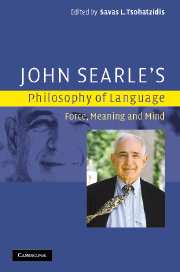1 - What is language: some preliminary remarks
Published online by Cambridge University Press: 08 January 2010
Summary
NATURALIZING LANGUAGE
I believe that the greatest achievements in philosophy over the past hundred or one hundred and twenty-five years have been in the philosophy of language. Beginning with Frege, who invented the subject, and continuing through Russell, Wittgenstein, Quine, Austin, and their successors, right to the present day, there is no branch of philosophy with so much high-quality work as the philosophy of language. In my view, the only achievement comparable to those of the great philosophers of language is Rawls' reinvention of the subject of political philosophy (and therefore implicitly the subject of ethics). But with this one possible exception, I think that work in the philosophy of language is at the top of our achievements.
Having said that, however, I have to record a serious misgiving I have about the subject. The problem is that its practitioners in general do not treat language as a natural phenomenon. This may seem a strange charge to make, given that so many contemporary and recent philosophers of language are anxious to emphasize the empirical character of their theories of language. Quine and Davidson are striking examples of resolute empiricism. My objection is that few contemporary and recent philosophers of language attempt to treat language as a natural extension of non-linguistic biological capacities. Language is not seen as continuous with, nor as an extension of, the rest of our specifically human biological inheritance. I think there is a deep reason, both historically and intellectually, why language has not been treated naturalistically.
- Type
- Chapter
- Information
- John Searle's Philosophy of LanguageForce, Meaning and Mind, pp. 15 - 46Publisher: Cambridge University PressPrint publication year: 2007
- 3
- Cited by



